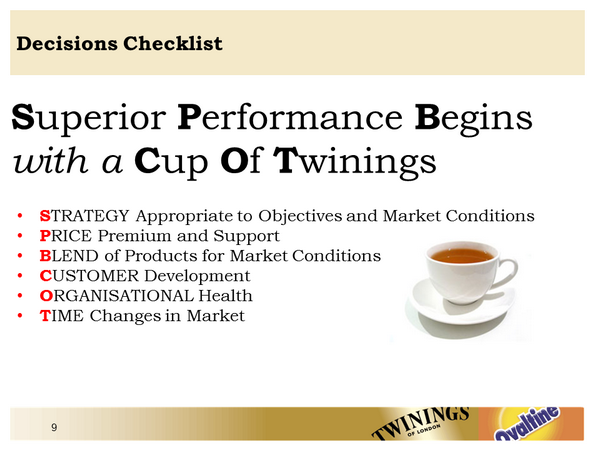Background to the customer:
Twining’s, based in Andover, Hampshire, is world famous for its distinctive teas and malt drinks. Twinings operates internationally within the Associated British Foods (ABF) Group and holds the world's oldest continually-used company logo, and is London's longest-standing rate-payer, having occupied the same premises on the Strand since 1706.
Customer needs
Each year Twining’s run a week long Leadership Development Programme for high potential managers. Two days of this programme are dedicated to CONSUME, an immersive Team-based Business Simulation game, where the participants form executive teams to compete intensively in running Twining’s Country businesses for a 3-year period.  The Solution
The Solution
The CONSUME Consumer Loyalty Business Simulation allows teams to run a B2C marketing-led consumer enterprise for a 3 year period in rounds lasting 12 months each. The business simulation requires the teams to engage with the central dilemmas of such a venture including: - Price Elasticity - Product Mix & Consumer Preferences - Profitability versus Market Share Growth - Value Chain versus Organisational Health Investment
Participant Feedback
The simulation has been run with over twenty manager teams and a detailed analysis of what differentiated the top performing teams from the rest identified 6 things they did differently:
1. They avoided the "Presumption of change" trap in that they considered what they must preserve as well as what they must change.
2. They suspended assumptions, thoroughly reviewed all available instructions/background research and actively sought out any available expert input
3. They rigorously followed the discipline of evidence-based decision-making and did not just rely on gut-feel, personal experience and common sense
4. They were prepared to make painful choices and trade-offs on their priorities where necessary when market conditions became difficult.
5. They displayed "coherence" of strategy and action. Their actions were consistent with their strategy and they did not ditch their strategy in difficult times.
6. They were open to collaboration, even with "competitor teams", and were always looking for advantage through "mutual learning alliances". They realised that it was not only about the winning of the game but the learning gained.
Overall Conclusions and Value
We asked Simon Brocket, International HR Director at Twinings who sponsored the simulation and provided subject matter expertise for the business simulation for his observations after the game had been run with multiple teams of managers over a 3-year period: “Realistic simulation is a powerful though often overlooked and underutilised approach to building capability. The business simulation we developed give people an experience that calls for them to develop and deploy competitive strategy. The learning people derive from the experience is very powerful and because it is theirs the transfer to the workplace is so much easier. We have been able to use the same business simulation over and over again with different groups within the company so the Return on Investment has been exceptionally good for us.”